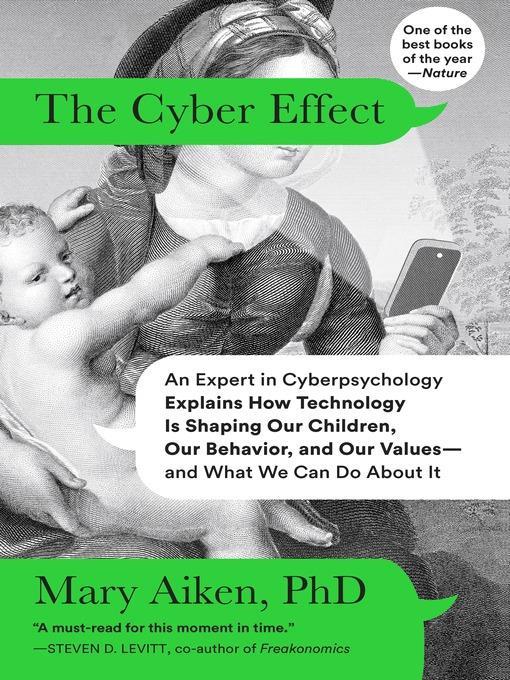
The Cyber Effect
An Expert in Cyberpsychology Explains How Technology Is Shaping Our Children, Our Behavior, and Our Values—and What We Can Do About It
کتاب های مرتبط
- اطلاعات
- نقد و بررسی
- دیدگاه کاربران
نقد و بررسی

July 4, 2016
Aiken, a self-described forensic cyberpsychologist, shows in compelling detail how the online world bleeds into people's daily lives in ways that occasionally involve actual bloodshed. The online environments that people increasingly inhabit provide a range of benefits, but they present as many problems. Aiken's stories are stirring enough to stand alone: she covers the near-normalized phenomenon of online dating, the addictive and fatal extremes of gaming, and even murders that are motivated by aspirations of Internet fame. Some analysis focuses on how children respond to the digitized world, information that is especially useful to parents hoping to protect their children from developing bad habits or ending up in danger. Aiken accompanies every anecdote with her own carefully researched, comprehensible analysis. Some of the final notes might read as extreme; for example, her suggestion of a general redesign of the Internet seems at this point inconceivable, and predictions of an all-encompassing battle between humans and machines feels more like the stuff of movies than of scholarship. Still, the relevance of Aiken's careful discussion is undeniable.

July 15, 2016
An expert in the field of cyberpsychology looks at how the interface between digital technology and our daily activities impacts social and personal relationships.Aiken is the founder and director of the Dublin-based CyberPsychology Research Centre and has advised INTERPOL, the FBI, and the White House. Although she specializes in cybercrime, the author focuses on the broader social impact of the rapid increase of internet access over the past 15 years ("from 6.5 to 43 percent of the global population") and the growth of cellphone use: an increase in subscriptions from 2 billion users in 2005 to 7 billion 10 years later. Moreover, average users check their phones more than 1,500 times a week. One consequence is divided attention between the digital device and the person in front of us--talking on the phone at the dinner table--and this has damaging effects on the quality of personal relationships, especially within families. Aiken is emphatic that intimate contact is essential for babies and toddlers. "A hug and a quick kiss aren't enough," she writes. "They need to be talked to, tickled, massaged and played with. And they need your eye contact." Even in the case of older children and adults, "intimate" relationships established and maintained online or even by phone cannot substitute for the more traditional ones based on face-to-face contact. Without the clues provided by body language and facial expression, which we normally rely on in face-to-face situations, we are handicapped in assessing trustworthiness and too easily fall victim to predators. Another major problem is the difficulty for parents and other caregivers of policing a child's access to inappropriate content and its easy availability for adolescents. The author argues for more regulation of internet content by governments so that children are denied access to "extreme content online--be it adult pornography or violence." In what is a growing genre, Aiken provides a thoughtful approach to the attractions, distractions, and pitfalls of our digital culture.
COPYRIGHT(2016) Kirkus Reviews, ALL RIGHTS RESERVED.

























دیدگاه کاربران